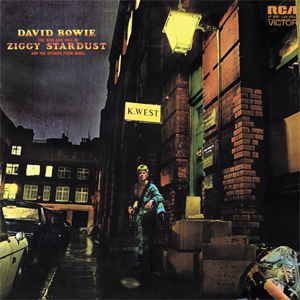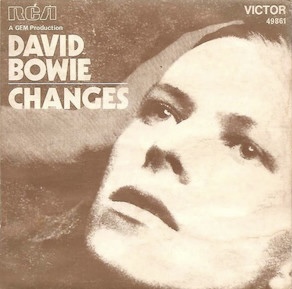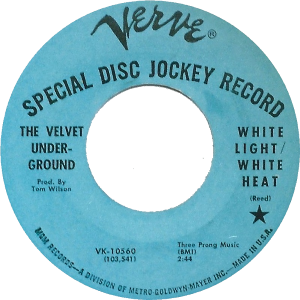Notes
- ↑ Kevin Cann (2010). Any Day Now - David Bowie: The London Years: 1947-1974: p.223
- ↑ Nicholas Pegg (2000). The Complete David Bowie: p.77
- ↑ Roy Carr & Charles Shaar Murray (1981). Bowie: An Illustrated Record: p.116
| "Bombers" | |
|---|---|
| Song by David Bowie | |
| from the album Hunky Dory (Rykodisc edition) | |
| Released | 30 January 1990 |
| Recorded | 9 July 1971 |
| Studio | Trident, London |
| Genre | Pop rock, glam rock |
| Length | 4:12 |
| Label | RCA |
| Songwriter(s) | David Bowie |
| Producer(s) | Ken Scott, David Bowie |
"Bombers" is a song written by English singer-songwriter David Bowie. It was recorded in July 1971 [1] and intended for the album Hunky Dory , but was replaced at the last minute by the cover "Fill Your Heart". [2]
It was released as a promo single by RCA in the US in November 1971, backed by a remix of "Eight Line Poem" that can only be found on this single (both tracks were also issued on an extremely limited edition promotional LP by RCA/Gem). A bootleg version backing "London Bye Ta-Ta" was also released in the early 1970s. [3] The track was eventually given wide release as a bonus track on the Rykodisc reissue of Hunky Dory in 1990.
The song was officially released for the second time in 2017 on a newly mixed re-issue of the promotional RCA/Gem LP (commonly entitled "Bowpromo") as an exclusive release for Record Store Day.

The Rise and Fall of Ziggy Stardust and the Spiders from Mars is the fifth studio album by English musician David Bowie, released on 16 June 1972 in the UK by RCA Records. It was co-produced by Bowie and Ken Scott and features Bowie's backing band the Spiders from Mars, comprising Mick Ronson, Trevor Bolder and Mick Woodmansey. Most of the songs were written around the same time as Bowie's previous album Hunky Dory (1971). After that album was completed, recording for Ziggy Stardust commenced in November 1971 at Trident Studios in London, with further sessions in early February 1972.

Michael Ronson was an English musician, songwriter, arranger, and producer. He achieved critical and commercial success working with David Bowie as one of the Spiders from Mars. He was a session musician who recorded five studio albums with Bowie followed by four with Ian Hunter, and also worked as a sideman in touring bands with Van Morrison and Bob Dylan.

Hunky Dory is the fourth studio album by English musician David Bowie, released on 17 December 1971 by RCA Records. Following the release of his 1970 album, The Man Who Sold the World, Bowie took time off from recording and touring. He settled down to write new songs, composing on piano rather than guitar as on earlier tracks. Following a tour of the United States, Bowie assembled a new backing band consisting of guitarist Mick Ronson, bassist Trevor Bolder and drummer Mick Woodmansey, and began to record a new album in mid-1971 at Trident Studios in London. Future Yes member Rick Wakeman contributed on piano. Bowie co-produced the album with Ken Scott, who had engineered Bowie's previous two records.

David Bowie is the self-titled debut studio album by English musician David Bowie. It was released in the UK on 1 June 1967 with Deram Records. Its style and content is often said to bear little overt resemblance to the type of music that he was later known for, such as the folk rock influenced "Space Oddity" or the glam rock of The Rise and Fall of Ziggy Stardust and the Spiders from Mars. NME critics Roy Carr and Charles Shaar Murray have said, "a listener strictly accustomed to David Bowie in his assorted '70s guises would probably find this debut album either shocking or else simply quaint", while biographer David Buckley describes its status in the Bowie discography as "the vinyl equivalent of the madwoman in the attic". Nicholas Pegg contends that "it seems a pity that David Bowie is only ever considered in terms of what we can extrapolate from it [...] Thankfully, it does seem that pop musicologists are at last beginning to regard David Bowie not just as a quirky set of embryonic twitterings, but as an album that's actually worth considering in its own right".

"Life on Mars?" is a song by English singer-songwriter David Bowie, first released on his 1971 album Hunky Dory. In 1968, Bowie was commissioned to write English lyrics for the Claude François French song "Comme d'habitude". After his lyrics were rejected, songwriter Paul Anka rewrote it into "My Way", which became famous by singer Frank Sinatra in 1969. Annoyed at the success of "My Way", Bowie used the song as a template and wrote "Life on Mars?" as a parody of Sinatra's recording. Like other songs Bowie wrote during this period, it was written primarily on piano. Recording for "Life on Mars?" took place on 6 August 1971, the final day of the Hunky Dory sessions. Co-produced by Bowie and Ken Scott, the backing band consisted of guitarist Mick Ronson, bassist Trevor Bolder and drummer Mick Woodmansey; Ronson also composed the song's string arrangement. After failing to acquire pianist Dudley Moore, piano was played by Strawbs member Rick Wakeman.

"Suffragette City" is a song by English singer-songwriter David Bowie. It was originally released in April 1972 as the B-side of the single "Starman" and subsequently appeared on his fifth studio album The Rise and Fall of Ziggy Stardust and the Spiders from Mars (1972). The song was later reissued as a single in 1976, with the US single edit of "Stay" as the B-side, to promote the compilation album Changesonebowie in the UK. Co-produced by Bowie and Ken Scott, it was recorded by Bowie at Trident Studios in London with his backing band the Spiders from Mars, consisting of Mick Ronson, Trevor Bolder and Mick Woodmansey, at a late stage of the album's sessions. The song was originally offered to English band Mott the Hoople, who declined it and recorded Bowie's "All the Young Dudes" instead. It is a glam rock song that is influenced by the music of Little Richard and the Velvet Underground. The lyrics include a reference to Anthony Burgess' novel A Clockwork Orange and the famous lyric "wham bam, thank you, ma'am".

The Man Who Sold the World is the third studio album by English musician David Bowie. It was originally released by Mercury Records in the United States on 4 November 1970 and in the United Kingdom on 10 April 1971. The album was produced by Tony Visconti and recorded at Trident and Advision Studios in London during April and May 1970. It features the first appearances of guitarist Mick Ronson and drummer Mick Woodmansey on a Bowie record, who would later become famous as members of the Spiders from Mars.

"Changes" is a song by English singer-songwriter David Bowie, originally released on his 1971 album Hunky Dory. RCA Records then released it as a single from the album on 7 January 1972. Written following his promotional tour of America in early 1971, "Changes" was recorded at Trident Studios in London between June and July that year. Co-produced by Bowie and Ken Scott, it featured Strawbs member Rick Wakeman on piano and the musicians who would later become known as the Spiders from Mars: guitarist Mick Ronson, bassist Trevor Bolder and drummer Mick Woodmansey. The song also marks the first instance of Bowie playing the saxophone on one of his recordings.
"All the Madmen" is a song written by David Bowie in 1970 for the album The Man Who Sold the World, released later that year in the US and in April 1971 in the UK. It was one of the many tracks on the album about insanity, it has been described as depicting "a world so bereft of reason that the last sane men are the ones in the asylums".
"Oh! You Pretty Things" is a song written by English singer-songwriter David Bowie, released on his 1971 album Hunky Dory. It was the first song he wrote for the album. Recorded as a demo, it was given to singer Peter Noone, lead singer of Herman's Hermits, who decided to release it as his debut solo single. Featuring Bowie on piano, Noone's recording was produced by Mickie Most and featured structural and lyrical differences from Bowie's later version. Released by RAK Records in April 1971 under the title "Oh! You Pretty Thing", the single peaked at number 12 in the UK, becoming Bowie's biggest success as a songwriter since his own single "Space Oddity" two years earlier.
"Kooks" is a song written by English singer-songwriter David Bowie, which appears on his 1971 album Hunky Dory. Bowie wrote this song to his newborn son Duncan Jones. The song was a pastiche of early 1970s Neil Young because Bowie was listening to a Neil Young record at home on 30 May 1971 when he got the news of the arrival of his son.
"Quicksand" is a song written by English singer-songwriter David Bowie and released on his 1971 album Hunky Dory.
"Song for Bob Dylan" is a song written by English singer-songwriter David Bowie for his 1971 album Hunky Dory. The song references Bob Dylan's 1962 homage to Woody Guthrie, "Song to Woody". Yet while Dylan opens with "Hey, hey, Woody Guthrie, I wrote you a song," Bowie addresses Dylan by his birth name saying, "Now, hear this, Robert Zimmerman, I wrote a song for you."

"Queen Bitch" is a song by English singer-songwriter David Bowie. It was originally released on his 1971 album Hunky Dory before appearing as the B-side of the single "Rebel Rebel" in the United Kingdom in early 1974. The song was inspired by the rock band the Velvet Underground, specifically their lead singer Lou Reed. It was debuted on BBC radio in June 1971 before being properly recorded at Trident Studios in London between late June and mid-July. Co-produced by Bowie and Ken Scott, the lineup consisted of the musicians who would later become known as the Spiders from Mars: guitarist Mick Ronson, bassist Trevor Bolder and drummer Mick Woodmansey; although he appeared on other Hunky Dory tracks, Rick Wakeman did not contribute to the recording.
"The Bewlay Brothers" is a song written by English singer-songwriter David Bowie in 1971 for the album Hunky Dory. One of the last tracks to be written and recorded for the LP, the ballad has been described as "probably Bowie's densest and most impenetrable song".

"White Light/White Heat" is a song recorded by the American rock band the Velvet Underground. It was released in January 1968 on their second studio album, White Light/White Heat. Also in January 1968, the song was released as a single with the B-side "Here She Comes Now".

Fame and Fashion is a compilation album by English musician David Bowie, issued in 1984 by RCA Records featuring songs recorded from 1969's David Bowie through 1980's Scary Monsters. It was released on LP, cassette, and CD formats. The subtitle "David Bowie's All-Time Greatest Hits" appears along with the title on LP and cassette labels, as well as on the CD face and inserts.
"Andy Warhol" is a song written by English singer-songwriter David Bowie in 1971 for the album Hunky Dory. It is an acoustic song about one of Bowie's early artist inspirations, the American pop artist Andy Warhol.
"Soul Love" is a song by English singer-songwriter David Bowie, released on his 1972 album The Rise and Fall of Ziggy Stardust and the Spiders from Mars by RCA Records. Co-produced by Bowie and Ken Scott, it features Bowie's backing band known as the Spiders from Mars – comprising guitarist Mick Ronson, bassist Trevor Bolder and drummer Mick Woodmansey. It was recorded on 12 November 1971 at Trident Studios in London and features a saxophone solo from Bowie and a guitar solo from Ronson. Lyrically, the song is about numerous characters dealing with love before the impending disaster that will destroy Earth as described in the album's opening track "Five Years". Like most tracks on the album, the song was rewritten to fit the Ziggy Stardust narrative.